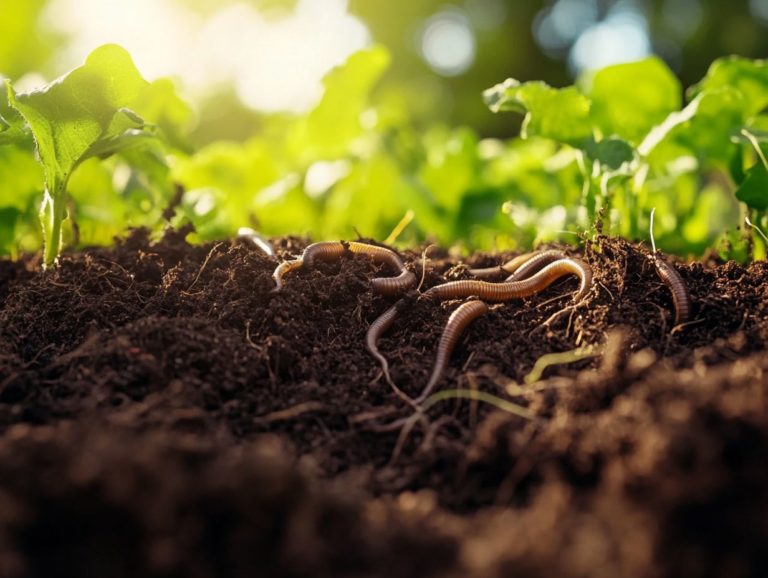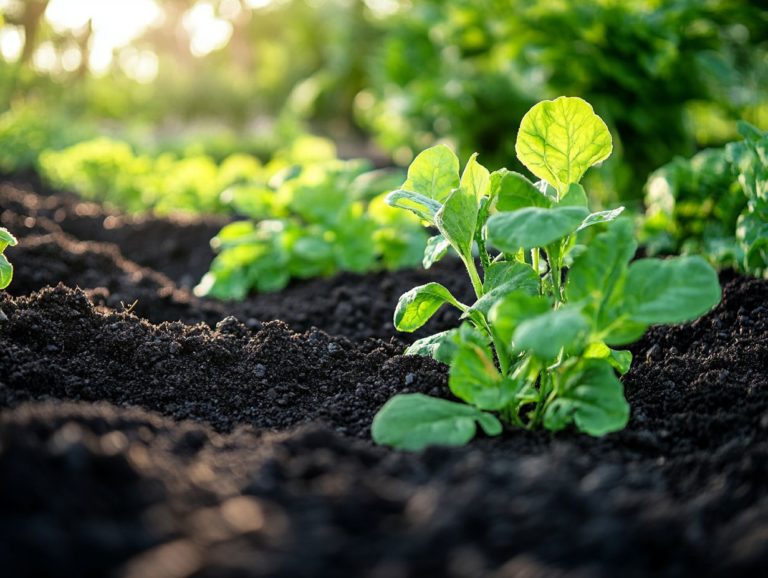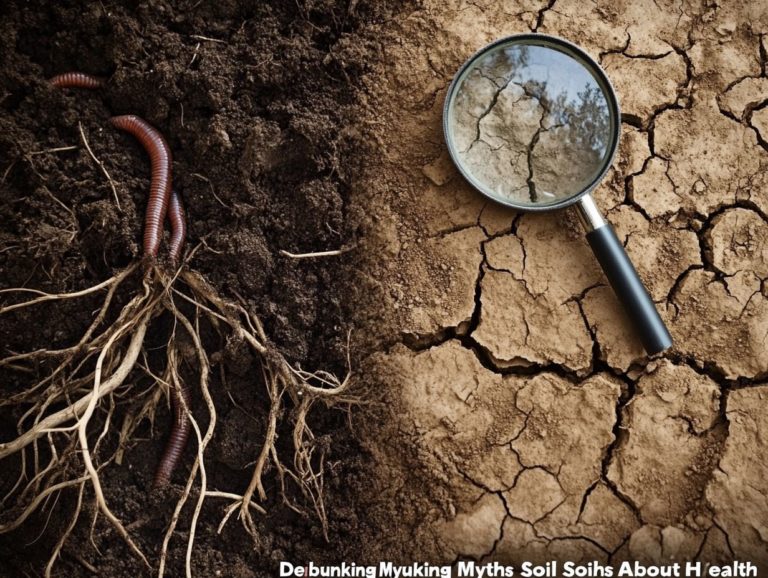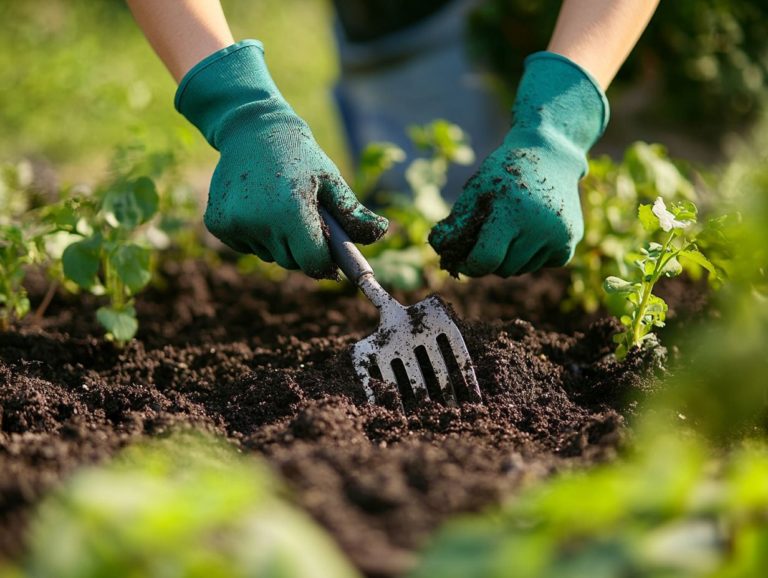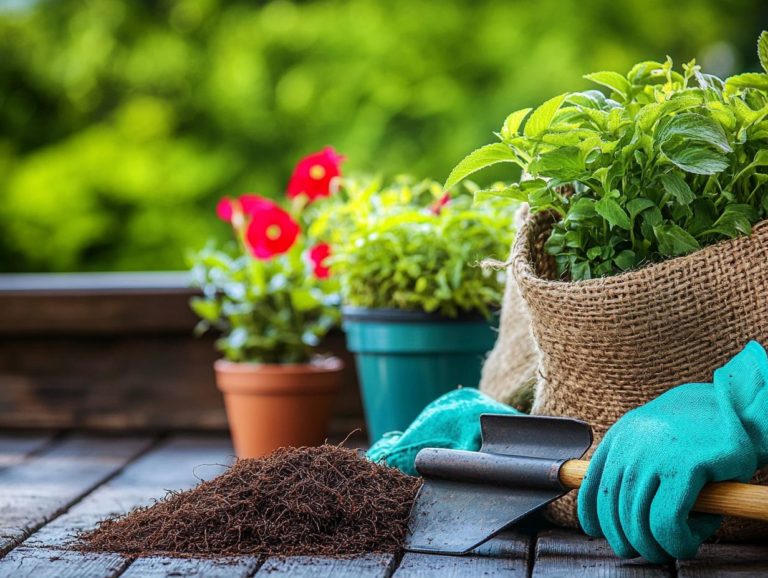Top 5 Soil Amendments for Healthy Gardens
Healthy gardens begin with healthy soil. The right soil amendments can transform your gardening experience.
This article delves into the top five soil amendments: compost, manure, peat moss, vermicompost, and bone meal. It explains what soil amendments are and why they are vital for plant health. You will also discover best practices for applying them effectively.
You’ll find insights into potential risks and handy tips for crafting your own organic amendments. Jump in and discover how to enrich your garden soil!
Contents
Key Takeaways:
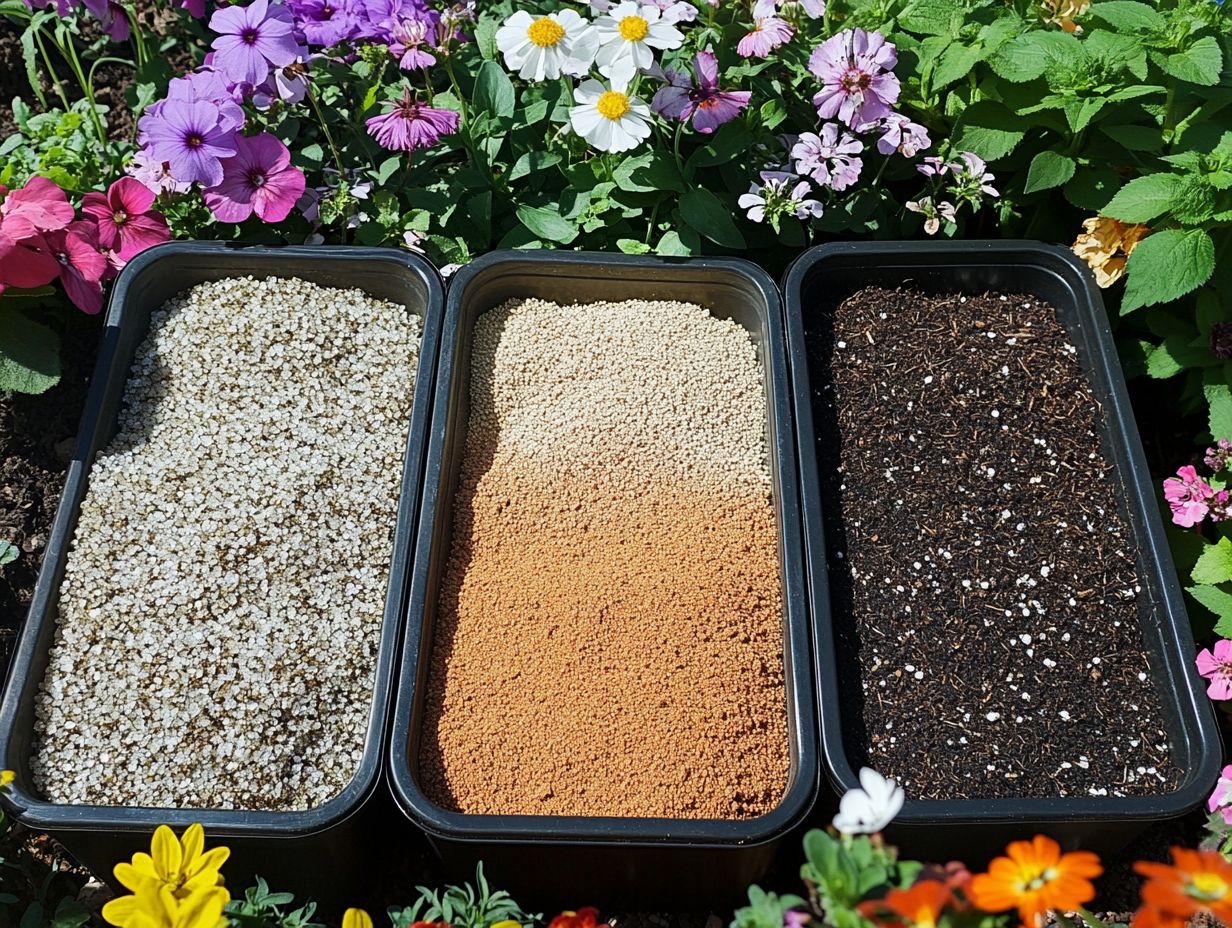
- Compost is a versatile and nutrient-rich soil amendment. It improves soil structure, provides essential nutrients, and promotes healthy plant growth.
- Animal manure, especially when composted, is a fantastic source of nutrients for garden soil. Use it sparingly and ensure it’s aged properly to avoid potential risks.
- Peat moss helps retain moisture, improve soil aeration, and provide valuable nutrients to plants. However, its sustainability and environmental impact are growing concerns.
1. Compost
Compost is vital for sustainable gardening. It provides nutrient-rich organic matter that enhances soil health and nurtures beneficial microorganisms.
This organic blend consists of kitchen scraps, yard waste, and other biodegradable materials like leaves, grass clippings, and coffee grounds. These elements enhance soil structure by improving aeration and drainage.
Compost also helps plants absorb nutrients, ensuring essential minerals are readily available. Many gardeners create compost tea by steeping compost in water. This liquid fertilizer enriches plant health and vitality, giving your garden that extra special touch.
2. Manure
Manure is a nitrogen-rich organic fertilizer. It enriches soil fertility by supplying essential nutrients and fostering the growth of beneficial microbes in the soil.
Different types of manure cow, chicken, and horse each offer unique qualities. Cow manure is known for its slow-release nitrogen and rich organic matter. Chicken manure has higher nitrogen and potassium content, making it perfect for leafy greens. Horse manure adds valuable fiber and improves soil structure.
For beginners, applying manure in the fall allows nutrients to break down over winter. Alternatively, spreading it in spring before planting provides a timely nutrient boost for a bountiful harvest.
3. Peat Moss
Peat moss is an invaluable asset in gardening. It is celebrated for its moisture retention abilities and capacity to enhance soil structure.
This versatile material elevates various soil types, whether you have sandy soils that drain rapidly or clay soils that hold water. Incorporating peat moss creates a balanced environment that promotes better nutrient absorption.
However, consider the environmental implications of harvesting peat moss. Its extraction can lead to habitat destruction and increased carbon emissions. Explore alternatives like coconut coir or compost, which are eco-friendly options that support healthy soil without compromising the environment.
4. Vermicompost
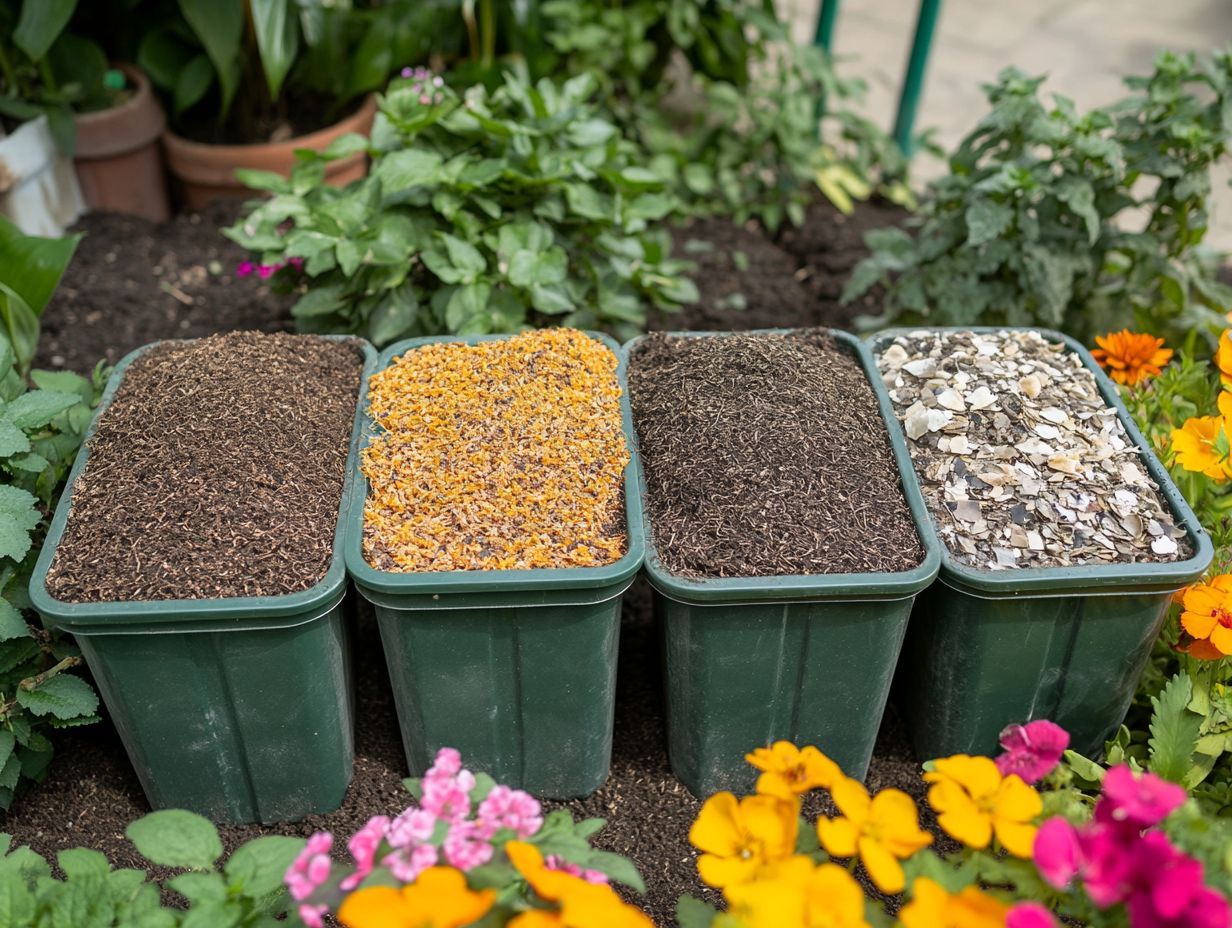
Vermicompost is made from nutrient-filled waste from worms. It significantly enhances soil health and boosts nutrient uptake, supporting a thriving community of beneficial microorganisms, which are vital for organic gardening.
Use specific worm species like red wigglers and European nightcrawlers to break down organic matter and transform it into compost. These industrious worms digest kitchen scraps and yard waste, excreting castings that serve as an excellent organic fertilizer. This significantly improves soil structure and moisture retention.
Incorporating vermicompost into your gardening practices enriches the soil with essential nutrients and strengthens the soil food web. Fostering diverse microbial life through vermicomposting enhances plant growth and resilience, creating a healthier ecosystem where plants flourish while garden pests struggle to thrive, acting as a natural pest deterrent.
5. Bone Meal
Bone meal is a sustainable choice for your garden. It offers essential nutrients like phosphorus and calcium carbonate that are vital for strong plant growth and improving soil fertility.
This natural supplement is particularly effective for flowering plants, fruits, and root vegetables, promoting robust root development and vibrant blooms. Incorporate bone meal into the soil a few weeks before planting to maximize nutrient availability.
Consider applying occasional top-dressing during the growing season for continued care. Integrating bone meal into your organic gardening practices not only supports your plants but also fosters a rich, biodiverse ecosystem. Try adding bone meal to your garden this season for the best results!
What Are Soil Amendments and Why Are They Important?
Soil amendments are essential to enhance soil health, address nutrient deficiencies, and optimize the various soil types in your garden. This approach promotes sustainable agricultural practices and boosts crop yields.
These amendments create a thriving environment for beneficial organisms and significantly contribute to a robust ecosystem. For instance, organic amendments like compost enrich your soil with vital nutrients while improving its structure, enhancing water retention and aeration.
Mineral amendments, such as gypsum and lime, help correct pH imbalances and supply essential nutrients often missing in over-farmed land. Thoughtfully incorporating these elements cultivates resilient soils that support vigorous plant growth, contributing to a healthier environment.
What Are the Different Types of Soil Amendments and Their Benefits?
Various types of soil amendments, from organic options like compost and manure to mineral powerhouses such as basalt and biochar, each play a unique role in enhancing soil quality and nurturing beneficial microbes.
These amendments improve soil structure by increasing aeration and drainage, promoting healthier growth for plant roots. For example, compost enriches the soil with essential nutrients while fostering a vibrant microbial environment.
Minerals like gypsum help alleviate soil compaction, promoting better root penetration and water retention. Adding biochar enhances nutrient retention and reduces soil acidity, creating an ideal habitat for beneficial microorganisms.
Together, these diverse soil amendments work harmoniously to cultivate a balanced, fertile environment that supports robust plant growth and productivity. Maximize your crop yields by incorporating these amendments into your gardening routine.
How Do Soil Amendments Benefit Plants and Soil Health?
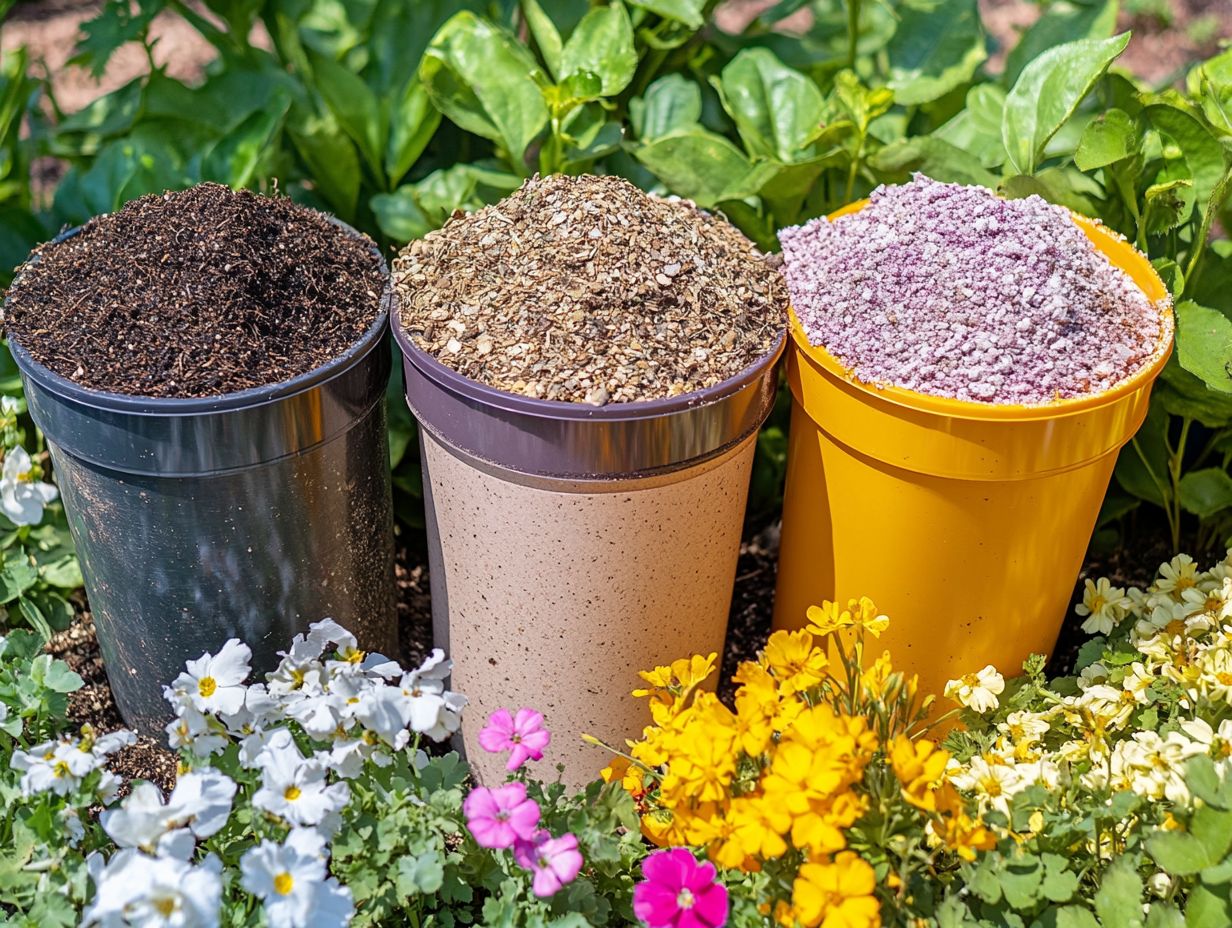
Soil amendments are your secret weapon for nurturing plants, enhancing nutrient uptake, improving drainage, and providing natural pest control. This creates an optimal environment for growth, allowing your plants to flourish and become resilient against environmental stresses.
Transform your soil by adding various organic materials, like compost. This enriches the soil with essential nutrients while simultaneously improving its structure. Consider incorporating peat moss; it significantly boosts water retention, making it particularly effective for thirsty crops such as tomatoes and peppers.
Adding lime can also be a game-changer for overly acidic soils, raising the pH level and enabling plants like lavender and asparagus to thrive. Certain amendments create a less inviting environment for pests, leading to healthier, more vigorous plants that are well-equipped to tackle any challenges in their growing conditions.
When and How Should Soil Amendments Be Applied?
The successful application of soil amendments relies on your ability to grasp the right timing and methods, enabling you to elevate soil health and promote robust plant growth.
By assessing the specific nutrient needs of your plants through soil tests, you can determine the optimal moments to introduce various amendments like compost, lime, or sulfur. Understanding the unique requirements of different crops will further refine your decisions, allowing for adjustments that align with seasonal shifts.
Utilizing tools such as soil probes, testers, and spreaders can greatly enhance your application process, making it both efficient and effective. With the right approach, you won t just nourish your plants; you ll cultivate a thriving ecosystem within your garden beds.
Are There Any Risks Associated with Using Soil Amendments?
While soil amendments offer a wealth of benefits, you should be aware of potential risks like excess nutrients and the introduction of harmful organisms, which can create environmental stresses for your plants.
These challenges emphasize the importance of understanding the specific needs of both your soil and the crops you re cultivating. It s essential for you, as a gardener or farmer, to apply amendments wisely, ensuring that the nutrient needs match your crops requirements.
Regular soil testing can help you identify imbalances or deficiencies, allowing for tailored adjustments. Keeping an eye out for signs of distress or disease enables you to catch any adverse effects early.
By following best practices such as responsibly utilizing organic amendments and adhering to recommended application rates you can significantly reduce these risks while enhancing the overall health of your soil.
How Can One Make Their Own Organic Soil Amendments?
Creating your own organic soil amendments, like compost and compost tea, is a game-changer for enhancing soil health. It not only nurtures your garden but also promotes sustainable gardening practices, reducing your reliance on commercial fertilizers.
By repurposing kitchen scraps, yard waste, and other biodegradable materials, you can effortlessly recycle natural resources while fostering a vibrant ecosystem around you.
The beauty of composting lies in its versatility; whether you opt for traditional bins or the engaging process of vermicomposting with worms, you have options that suit your gardening style. This process can meet the specific needs of your soil, ensuring that your amendments effectively enrich sandy, clay, or loamy grounds based on their unique nutrient requirements.
Incorporating natural remedies like bone meal or fish emulsion can provide targeted support for your plants at various growth stages. By understanding each plant’s specific needs, you further enhance the effectiveness of these organic amendments, creating a harmonious balance in your garden that thrives on nature s bounty.
Frequently Asked Questions
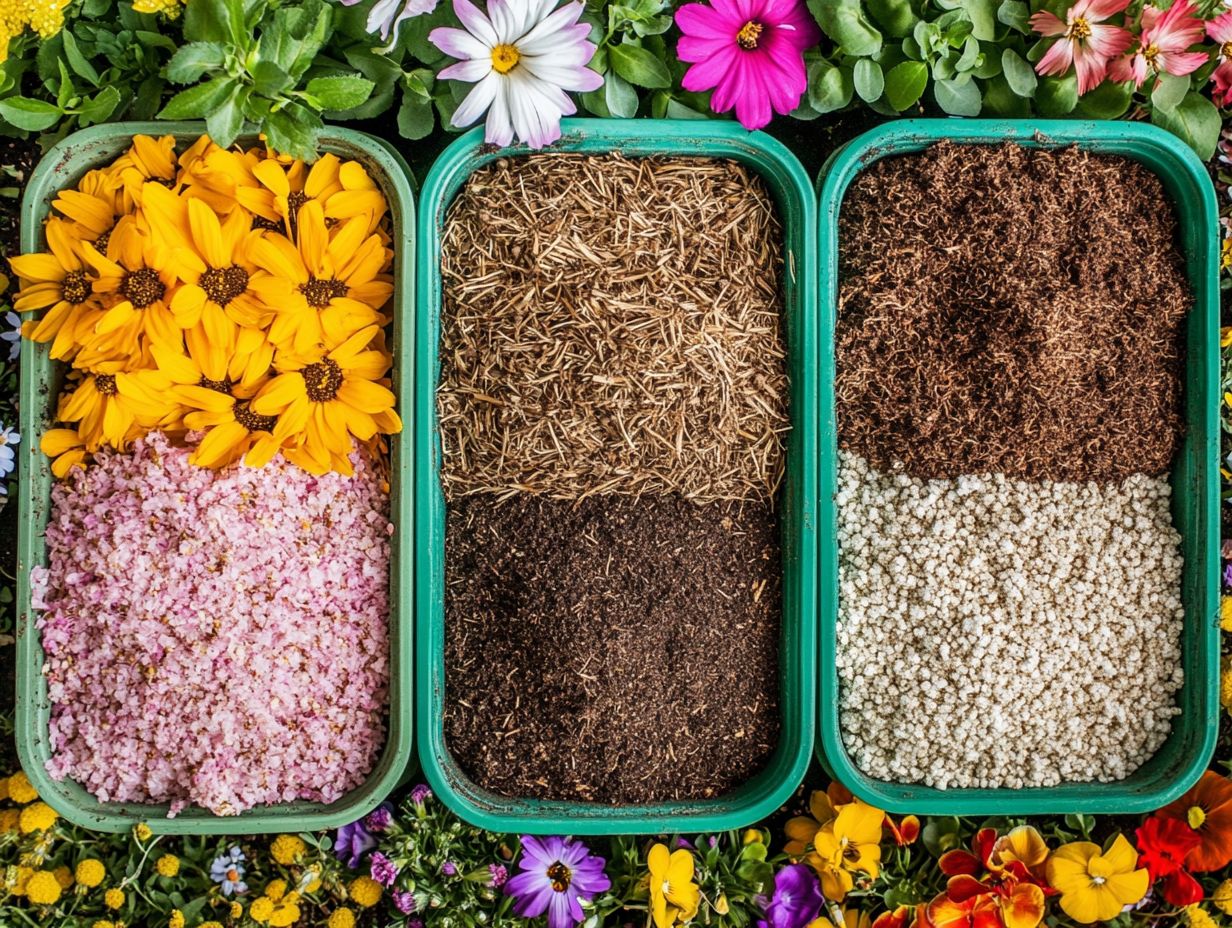
What are the top 5 soil amendments for healthy gardens?
The top 5 soil amendments for healthy gardens include compost, manure, peat moss, vermiculite, and perlite.
Why is compost considered one of the best soil amendments?
Compost is one of the best soil amendments. It improves soil structure, provides essential nutrients, and fosters beneficial microorganisms!
How does manure benefit garden soil?
Manure enriches soil with nutrients and organic matter. It boosts fertility, structure, and enhances water retention!
What is the role of peat moss in healthy gardens?
Peat moss acts as a natural soil conditioner. It retains moisture, aerates the soil, and improves nutrient availability!
What makes vermiculite a top soil amendment?
Vermiculite is a lightweight mineral that enhances soil drainage and aeration. It holds on to key nutrients for plants!
How does perlite benefit garden soil?
Perlite is a volcanic rock that improves soil aeration and drainage. It prevents compaction and enhances water retention!
Try these amendments in your garden for healthier plants and a thriving garden ecosystem!

